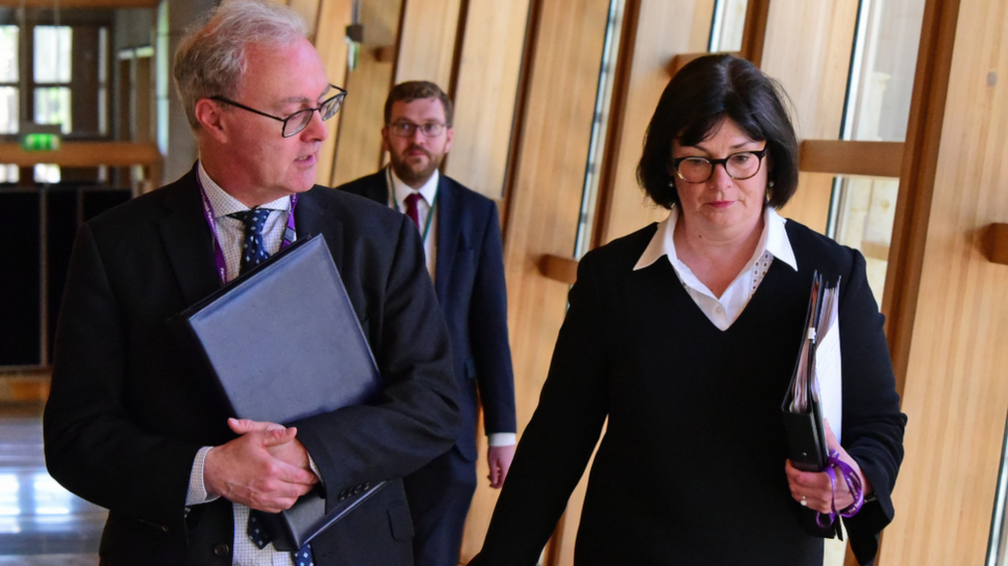What are the roles of Scotland's lord advocate, and do they clash?
- Published
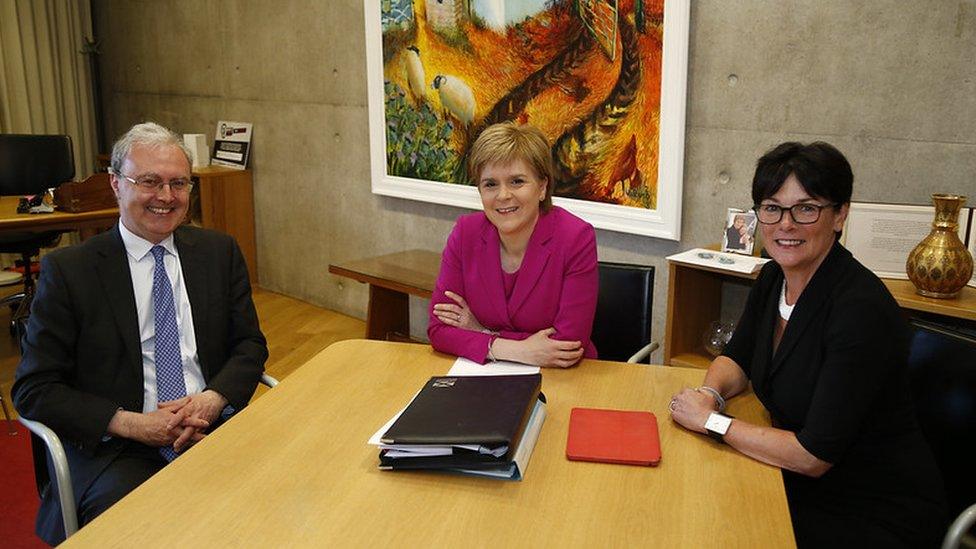
James Wolffe and Alison Di Rollo were appointed as Scotland's law officers by Nicola Sturgeon in 2016
The search is on for a new lord advocate after James Wolffe QC announced he would be stepping down as the Scottish government's top law officer.
Whoever gets the job will be faced by issues ranging from Covid-19 to the constitution, as well as questions over the very nature of the post itself.
What are the roles of the lord advocate, why have they been controversial, and what will the next incumbent have waiting in their in-tray?

What is the lord advocate's job?
Outside of political circles, the lord advocate is perhaps best known as the head of Scotland's independent prosecution service, the Crown Office and Procurator Fiscal Service (COPFS).
This means they have ultimate responsibility for the prosecution of crime and the investigation of deaths north of the border.
Whenever an "indictment" is laid against someone in a criminal trial - the court document which sets out the charges against the accused in the most serious cases - it is done so in the name of "Her Majesty's Advocate".
They are represented in court by a professional prosecutor, but the case will literally be tried in the lord advocate's name as "HMA vs Joe Bloggs".
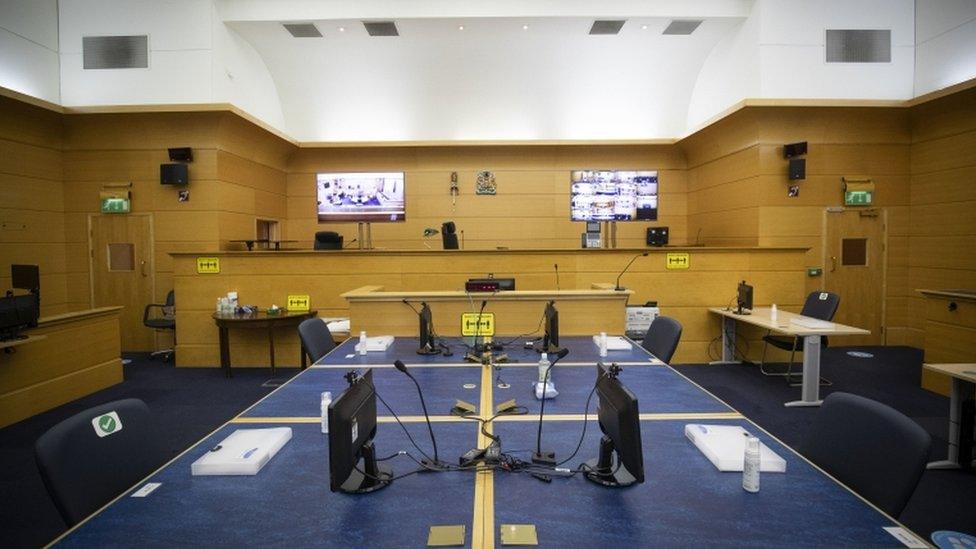
The most serious criminal cases tried in Scottish courts are done so in the name of "Her Majesty's Advocate"
What about the government part?
The office of lord advocate dates back to the 1400s, and after 1707 was the chief legal advisor to the UK government on Scottish legal matters.
After devolution, the lord advocate became legal advisor to the Scottish government, while a new office of Advocate General for Scotland was set up to advise the Crown and UK ministers on matters of Scots law.
The law officer posts - including the deputy role of solicitor general - are part of the Scottish government. As well as advising ministers on legal wrangles and legislative plans, they can take part in the weekly meetings of the first minister's cabinet.
This was dropped as a regular practice by Alex Salmond in 2007 in a bid to "de-politicise" the post, but the Lord Advocate can still attend when legal issues are expected to come up - and there have been more than a few of those in recent years.
They can also sit on the government benches at Holyrood and make statements to MSPs or answer questions on behalf of ministers.
And the lord advocate tends to represent the Scottish government in big court cases, with recent examples including the various legislative disputes over Brexit and the powers of the Scottish Parliament.
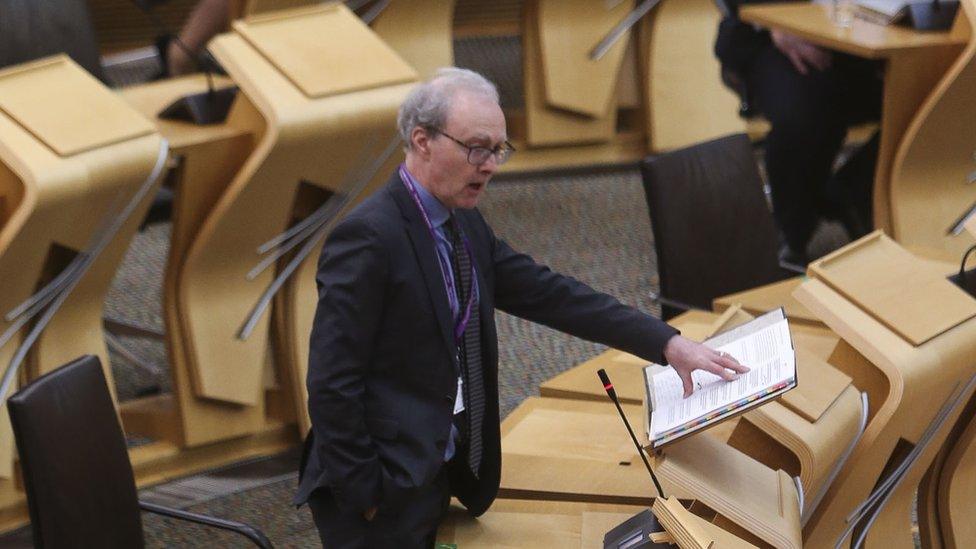
As a member of the Scottish government, the lord advocate is occasionally called on to address MSPs in the Holyrood chamber
Why do some want the roles split up?
Debate over the two "hats" worn by the lord advocate has been going on in legal circles pretty much since devolution.
However calls for the job to be split into separate roles have been intensified by the row over the Holyrood inquiry into the government's mishandling of complaints against Alex Salmond.
A particular point of contention was the intervention of the Crown to have one of Mr Salmond's submissions redacted over fears it did not comply with court orders, prompting a furious response from the former first minister and opposition parties.
Mr Wolffe insisted he was not personally involved in any decisions around the Salmond inquiry, and dismissed claims that the move was in any way politically motivated as "wholly without foundation".
However the furore brought fresh focus to the question of the dual roles of the lord advocate, with Scottish Labour leader Anas Sarwar saying there were "real questions" about the "separation of power" between the prosecutorial service and the government's legal advisor.
Some have suggested shifting to a model similar to that used in England and Wales, where there is a separate office of "director of public prosecutions".
In March, Mr Wolffe told MSPs that while other systems were available, he was "satisfied that the different responsibilities and functions can be combined with integrity" by the lord advocate.

The lord advocate still attends cabinet meetings when legal matters are on the agenda
What will be in the next lord advocate's in-tray?
Whatever shape the role ultimately takes, the next lord advocate has a number of weighty issues waiting for them.
The recovery from Covid-19 poses a range of challenges for the prosecution service, with an ever-mounting backlog of trials and a dispute over government resilience funds which recently saw defence lawyers go on strike, external.
There is the perennial issue of independence, with ministers making plans to draw up a referendum bill - something the Lord Advocate would have to be happy was within Holyrood's powers, given they could end up defending it in the Supreme Court.
The protracted row with Mr Salmond is not over, with the former first minister planning fresh proceedings against the government over the conduct of its top civil servant.
There is also the storm over the failed prosecution of individuals linked to Rangers Football Club, and the payment of tens of millions of pounds in damages - something Mr Wolffe had to issue an "unreserved apology" for, despite the fact he wasn't in office at the time.
There has also been controversy about yet another facet of the job, fatal accident inquiries. Some high-profile investigations have dragged on for years, with Lib Dem leader Willie Rennie writing the system off as "dysfunctional".
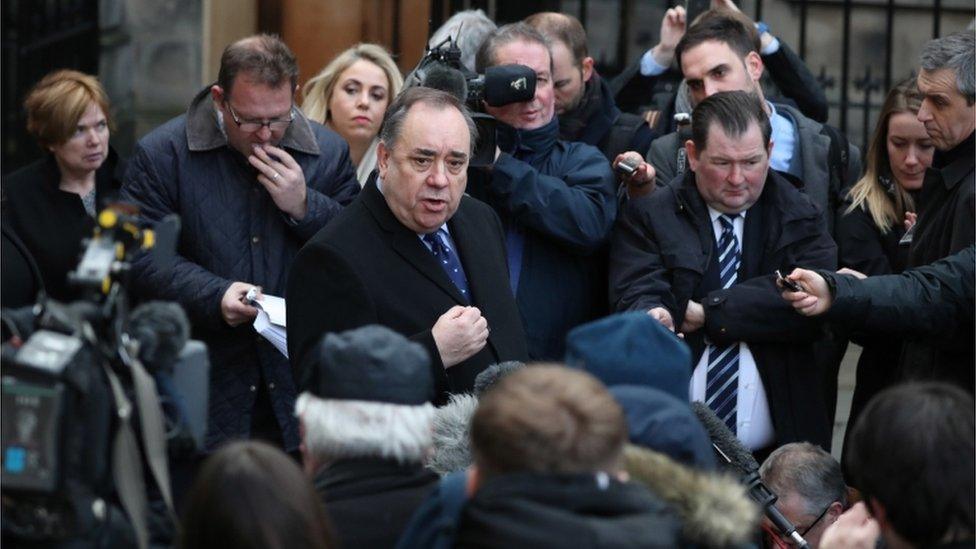
Alex Salmond plans to take the Scottish government to court for a second time over its botched investigation of him
Who might get the job?
The office of Lord Advocate has always been held by an eminent lawyer. The next incumbent is likely to come from a select group at the pinnacle of the legal profession in Scotland.
Mr Wolffe was formerly Dean of the Faculty of Advocates, the professional body for Scotland's court lawyers.
His immediate predecessors were Frank Mulholland and Dame Eilish Angiolini, both QCs who had a background in the prosecution service and who served as solicitor general before graduating to the top job.
However, the current solicitor general, Alison Di Rollo, announced her departure alongside that of Mr Wolffe.
Although the role has changed hands immediately after the last three Holyrood elections, it is not fixed to political terms or which party is in government - Dame Eilish was appointed by Jack McConnell, then kept on by Alex Salmond.
But given the issues ahead, there will be intense interest in political circles about who is going to get the job.
Related topics
- Published23 May 2021
